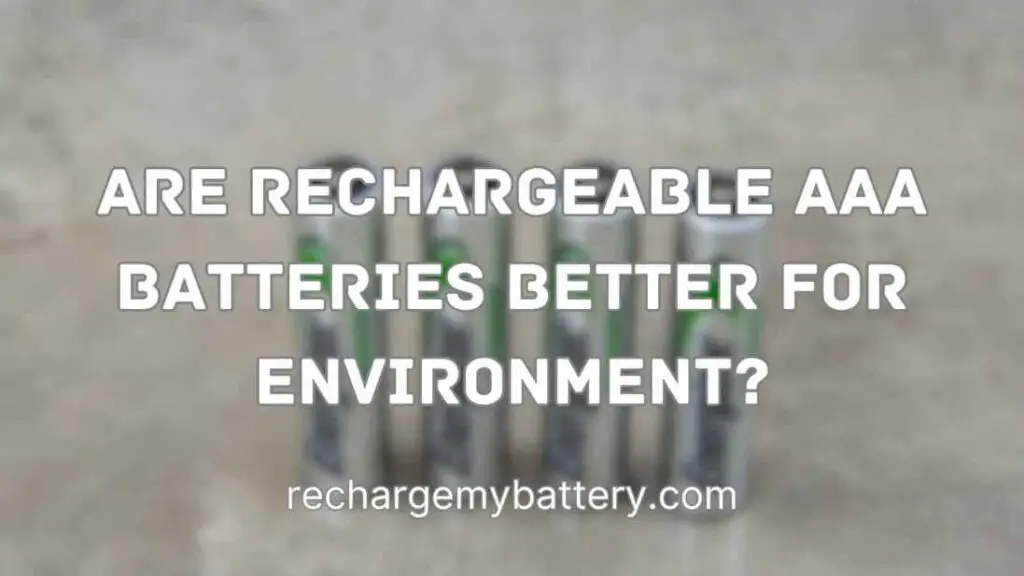In recent years, there has been an increasing awareness and concern for the environment, prompting people to seek eco-friendly alternatives in various aspects of their lives. One question that often arises is whether rechargeable AAA batteries are a more environmentally friendly choice compared to disposable batteries.
In this article, we will examine the environmental impact of rechargeable AAA batteries and discuss their advantages and disadvantages.
Environmental Impact
When it comes to environmental impact, rechargeable AAA batteries offer several benefits.
Unlike disposable batteries, which end up in landfills and contribute to electronic waste, rechargeable batteries can be reused multiple times. This significantly reduces the amount of waste generated and minimizes the potential harm to the environment.
Energy Consumption
Rechargeable AAA batteries require energy for charging, which may raise concerns about their overall energy consumption. However, considering their lifespan, rechargeable batteries tend to be more energy-efficient.
Unlike disposable batteries that are single-use and constantly replaced, rechargeable batteries can be charged and used multiple times, making them a more sustainable choice in the long run.
Lifespan and Durability
One of the key advantages of rechargeable AAA batteries is their longer lifespan compared to disposable batteries.
Rechargeable batteries are designed to withstand hundreds or even thousands of charge cycles, making them durable and reliable. This extended lifespan reduces waste and saves money by eliminating the need for frequent battery replacements.
Cost Effectiveness
Although rechargeable AAA batteries have a higher upfront cost than disposable batteries, they offer significant cost savings over time.
As mentioned earlier, rechargeable batteries can be reused multiple times, eliminating the need for frequent purchases. This makes them a cost-effective choice, especially for devices that require frequent battery replacements.
Recycling and Waste
While rechargeable AAA batteries are reusable, they eventually reach the end of their lifespan. However, they can be recycled at designated recycling centers, reducing their environmental impact.
In contrast, disposable batteries often end up in landfills, where their components may leach harmful chemicals into the soil and water. Properly recycling rechargeable batteries help minimize waste and promotes a more sustainable approach to battery usage.
Convenience
Disposable AAA batteries are readily available and convenient for immediate use. However, rechargeable AAA batteries require regular charging, which may be seen as less convenient by some users.
Nevertheless, advancements in rechargeable battery technology have led to faster charging times and improved overall performance, bridging the convenience gap between disposable and rechargeable options.
Performance
In terms of performance, rechargeable AAA batteries have made significant advancements in recent years. Modern rechargeable batteries offer comparable or even superior performance to disposable batteries.
They provide stable power output throughout their charge cycle, making them suitable for devices that demand consistent performance, such as digital cameras, remote controls, and gaming controllers.
Compatibility
Rechargeable AAA batteries are generally compatible with a wide range of devices that require AAA batteries. However, it is important to check the device’s specifications to ensure compatibility.
Some devices, particularly those with high power requirements, may have specific battery compatibility guidelines. It is crucial to follow these guidelines to ensure optimal performance and safety.
Overall Verdict
Taking into consideration the various factors discussed, rechargeable AAA batteries offer a more environmentally friendly option compared to disposable batteries. They reduce waste, save money in the long term, and provide comparable or even better performance.
While rechargeable batteries require an initial investment and regular charging, the overall benefits outweigh these minor inconveniences. Choosing rechargeable AAA batteries is a responsible choice that contributes to a more sustainable future.
Conclusion
In conclusion, rechargeable AAA batteries have several advantages over disposable batteries, including a reduced environmental impact, increased energy efficiency, longer lifespan, cost-effectiveness, recycling options, and comparable or better performance.
Rechargeable batteries minimize waste and the harmful effects of electronic waste on the environment. While they require energy for charging, their ability to be reused multiple times makes them more energy-efficient in the long run.
Considering all these factors mentioned in this article, it is clear that rechargeable AAA batteries are a better choice for the environment. By switching to rechargeable batteries, individuals can contribute to a more sustainable future while benefiting from longer lifespan, cost savings, and improved performance.
So, the next time you require AAA batteries, consider choosing rechargeable ones and join the effort to protect our planet.
Thank you so much for reading this article.
FAQs
Q1. Are rechargeable AAA batteries more expensive than disposable batteries?
By investing in rechargeable AAA batteries, you can avoid the continuous purchasing of disposable batteries and save money in the long run.
Q2. Can rechargeable AAA batteries be used in all devices?
Q3. How many times can rechargeable AAA batteries be recharged?
Q4. Do rechargeable AAA batteries perform as well as disposable batteries?
However, some high-drain devices may have specific power requirements that need to be considered for optimal performance.
Q5. Are there any environmental concerns associated with rechargeable AAA batteries?
However, it is important to properly recycle rechargeable batteries at designated recycling centers to prevent any potential environmental impact from their components.


